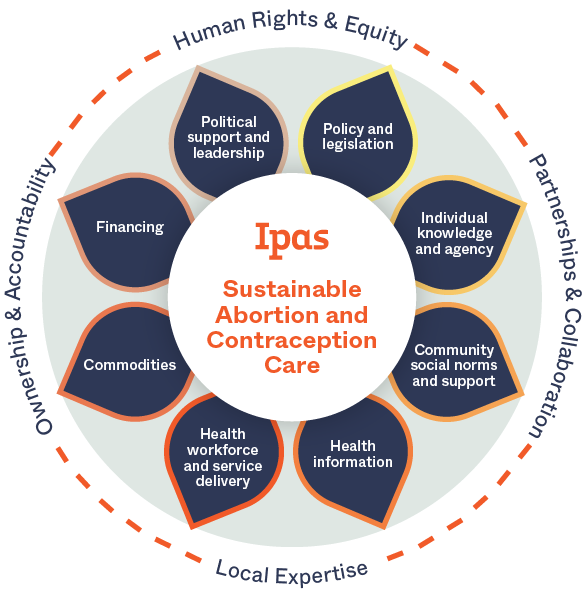1. What is Ipas Bangladesh?
Ipas Bangladesh is an international non-governmental organization dedicated to improving women’s access to sexual and reproductive health and rights (SRHR) services, including menstrual regulation (MR), and post-abortion care (PAC). We are part of the global Ipas network, which operates in over 40 countries across Africa, Asia, and the Americas. Our work aligns with Ipas’s international strategy to advance reproductive justice and ensure all women and girls have access to essential reproductive health services. Ipas Bangladesh has been working since 2011.
2. What are Ipas Bangladesh’s core program areas and focus?
Ipas Bangladesh focuses on the following core program areas:
· MR and PAC
· Family planning (FP) and contraception
· Climate justice and SRHR
· Sexual and Gender-Based Violence (SGBV) prevention and response
· Comprehensive Sexuality Education (CSE)
Ipas Bangladesh recognizes the interconnections between reproductive health and other social and environmental issues. We are working to integrate climate justice, SRHR, SGBV, and CSE into our programs and services, ensuring that our work addresses the root causes of reproductive health problems and promotes holistic well-being.
3. What is Menstrual Regulation (MR) and Post-Abortion Care (PAC)?
Menstrual Regulation (MR) is a safe procedure for establishing the nonpregnancy status of a woman when a woman misses her period. Bangladesh defined MR as “an interim method of establishing non-pregnancy for a woman at risk of pregnancy, whether or not she actually is pregnant.”
The World Health Organization (WHO) defines MR as “Uterine evacuation without laboratory or ultrasound confirmation of pregnancy for women who report recent delayed menses” (Safe abortion: technical and policy guidance for health systems, 2nd edition, WHO 2012).
Post-abortion care (PAC) is a comprehensive approach to managing complications from incomplete abortion or miscarriage. It includes medical treatment, counseling, contraceptive services, and related sexual and reproductive health care, addressing a woman’s physical and emotional health needs.
4. What are the legal and policy aspects of MR and PAC in Bangladesh?
· The Penal Code 1860 (Sections 312-316) allows abortion only to save a woman’s life.
· In 1972, the government temporarily suspended Sections 312-316 of the Bangladesh Penal Code 1860 to allow abortion, considering the reality immediately after the liberation war in 1971.
· In 1974, abortion care was introduced in government health facilities under the name of MR.
· In 1979, MR was incorporated into the national family planning (FP) program.
· In 2016, the government included MR and PAC services as essential services for all tiers of health facilities and incorporated them into the Essential Services Package (ESP) of the Ministry of Health and Family Welfare (MoHFW).
· Bangladesh’s policy allows trained midlevel providers to conduct MR up to 10 weeks after a missed period, and doctors to perform it up to 12 weeks, based on the woman’s choice.
· Medical abortion (MR with medication – MRM) up to 10 weeks after a missed period was introduced in the Bangladesh program in 2014.
5. How does Ipas Bangladesh work to expand access to MR and PAC in Bangladesh?
Ipas Bangladesh collaborates with government ministries, agencies, and NGOs to expand access to MR and PAC services. We advocate for policy changes, develop and implement evidence-based guidelines, and provide training to healthcare officials and providers to ensure that all women and girls have access to these services.
6. How does Ipas Bangladesh work with government officials and policymakers?
Ipas Bangladesh collaborates closely with government officials and policymakers to influence reproductive health and rights policies and regulations. We provide technical support and evidence-based research to inform policy decisions while engaging in advocacy campaigns to promote key priorities in reproductive health.
7. How can organizations collaborate and partner with Ipas Bangladesh?
Organizations can collaborate with Ipas Bangladesh through joint programs and advocacy initiatives. We welcome partnerships that align with our mission to improve access to SRHR services.
8. How can donors and foundations support Ipas Bangladesh’s work?
Donors and foundations can support our work through financial contributions, partnerships, and advocacy for SRHR. To discuss support options or make a donation, please contact us at our official email address: [email protected]
9. How can I stay updated with Ipas Bangladesh’s activities?
To stay updated with Ipas Bangladesh’s activities, you can visit our website, and subscribe to our newsletter. Additionally, you can follow us on our social media platforms, including Facebook, LinkedIn, and Instagram.

